
Frank Costello was an Italian-American crime boss of the Luciano crime family.

Moshe Katsav is an Israeli former politician who was the eighth President of Israel from 2000 to 2007. He was also a leading Likud member of the Israeli Knesset and a minister in its cabinet. He was the first Mizrahi Jew to be elected to the presidency, and second non-Ashkenazi president after Yitzhak Navon.
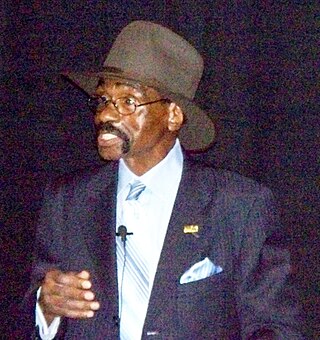
Rubin "Hurricane" Carter was an American-Canadian middleweight boxer, wrongfully convicted and imprisoned for murder, until released following a petition of habeas corpus after almost 20 years in prison.
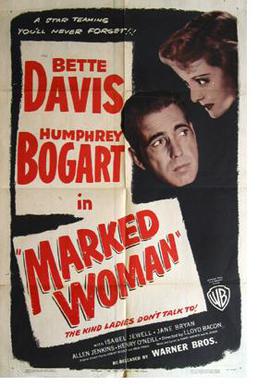
Marked Woman is a 1937 American dramatic crime film directed by Lloyd Bacon and starring Bette Davis and Humphrey Bogart, with featured performances by Lola Lane, Isabel Jewell, Rosalind Marquis, Mayo Methot, Jane Bryan, Eduardo Ciannelli and Allen Jenkins. Set in the underworld of Manhattan, Marked Woman tells the story of a woman who dares to stand up to one of the city's most powerful gangsters.
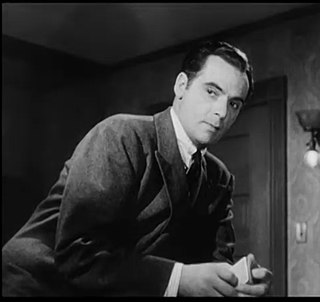
Marc Lawrence was an American character actor who specialized in underworld types. He has also been credited as F. A. Foss, Marc Laurence and Marc C. Lawrence.
The Trenton Six is the group name for six African-American defendants tried for murder of an elderly white shopkeeper in January 1948 in Trenton, New Jersey. The six young men were convicted in August 1948 by an all-white jury of the murder and sentenced to death.

Jonathan Hale was a Canadian-born film and television actor.
Oregon v. Guzek, 546 U.S. 517 (2006), was a decision by the Supreme Court of the United States, which ruled that the Eighth Amendment to the United States Constitution does not grant criminal defendants facing the death penalty the right to introduce new evidence of their innocence during sentencing that was not introduced during trial. Accordingly, states could constitutionally exclude such evidence from the sentencing phase of a capital trial.

Gary Tyler, from St. Rose, Louisiana, is an African-American man who is a former prisoner at the Louisiana State Prison in Angola, Louisiana. He was convicted of the October 7, 1974 shooting death of a white 13-year-old boy and the wounding of another, on a day of violent protests by whites against black students at Destrehan High School in St. Charles Parish, Louisiana. He was tried as an adult and convicted of first-degree murder at age 17 by an all-white jury; he received the mandatory death sentence for that crime, according to state law. When he entered Louisiana State Prison (Angola), he was the youngest person on death row.
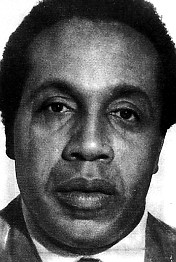
Frank Lucas was an American drug lord who operated in Harlem, New York City, during the late 1960s and early 1970s. He was known for cutting out middlemen in the drug trade and buying heroin directly from his source in the Golden Triangle in Southeast Asia. Lucas boasted that he smuggled heroin using the coffins of dead American servicemen, as depicted in the feature film American Gangster (2007), which fictionalized aspects of his life. This claim was denied by his Southeast Asian associate Leslie "Ike" Atkinson.
This is a list of notable overturned convictions in the United States.

Channon Gail Christian, aged 21, and Hugh Christopher Newsom Jr., aged 23, were from Knoxville, Tennessee, United States. They were kidnapped on the evening of January 6, 2007, when Christian's vehicle was carjacked. The couple were taken to a rental house. Both of them were raped, tortured, and murdered. Four males and one female were arrested, charged, and convicted in the case. In 2007, a grand jury indicted Letalvis Darnell Cobbins, Lemaricus Devall Davidson, George Geovonni Thomas, and Vanessa Lynn Coleman on counts of kidnapping, robbery, rape, and murder. Also in 2007, Eric DeWayne Boyd was indicted by a federal grand jury of being an accessory to a carjacking, resulting in serious bodily injury to another person and misprision of a felony. In 2018, Boyd was indicted on state-level charges of kidnapping, robbery, rape, and murder.

Henri Theodore Young was an American convicted bank robber and murderer who, while serving one of a series of prison terms, attempted to escape from Alcatraz Federal Penitentiary with four other inmates in 1939. During the escape attempt two inmates, Dale Stamphill and Arthur "Doc" Barker, were shot, the latter fatally. All survivors were quickly recaptured. Two of the men, Young and Rufus McCain, were sentenced to solitary confinement and served the terms at Alcatraz for a period of three years. Eleven days after re-entering the Alcatraz general prison population in 1942, Young murdered McCain.
Richard M. Roberts is an American attorney. Roberts was a former law enforcement officer who worked as a detective in the Essex County Prosecutor’s Office and Essex County Bureau of Narcotics. After completing law school at Seton Hall University and passing the bar examination, Roberts served as an Assistant Prosecutor in the Essex County Prosecutor's Office.

You Can't Get Away with Murder is a 1939 crime drama directed by Lewis Seiler, starring Humphrey Bogart and Gale Page, and featuring "Dead End Kid" leader Billy Halop. The film is from Bogart's period of being cast in B pictures by Warner Bros., before his breakthrough as a leading man in High Sierra two years later. The film is based on the play "Chalked Out" by Lewis E. Lawes.
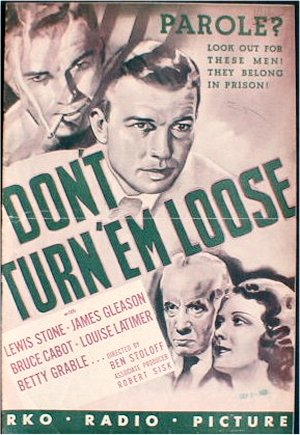
Don't Turn 'Em Loose is a 1936 American crime drama film directed by Ben Stoloff and produced by RKO Radio Pictures, who released the film on September 18, 1936. Written by Harry Segall and Ferdinand Reyher, the production's screenplay is at least partially based on "Homecoming" by Thomas Walsh, a short story published in Collier's magazine in March 1936. The film costars Lewis Stone, James Gleason, Bruce Cabot, Louise Latimer and Betty Grable.
Code of the Streets is a 1939 Universal Studios film starring The Little Tough Guys.
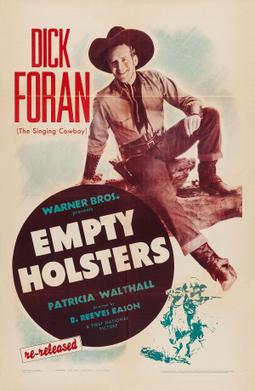
Empty Holsters is a 1937 American Western film directed by B. Reeves Eason and written by John T. Neville. The film stars Dick Foran, Patricia Walthall, Emmett Vogan, Glenn Strange, Anderson Lawler and Wilfred Lucas. The film was released by Warner Bros. on July 10, 1937.

Paroled – To Die is a 1938 American Western film directed by Sam Newfield and written by George H. Plympton. The film stars Bob Steele, Kathleen Eliot, Karl Hackett, Horace Murphy, Steve Clark and Budd Buster. The film was released on January 11, 1938, by Republic Pictures.
Gilles Mathieu, better known as "Trooper", is a Canadian outlaw biker and gangster who served as the secretary to the elite Nomad chapter of the Hells Angels Motorcycle Club in Quebec from 1995 to his arrest in 2001.















